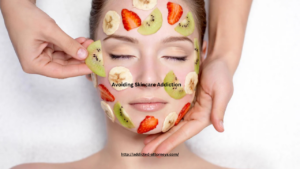 When it comes to skincare, many people focus on external solutions—serums, creams, and treatments—to achieve a flawless complexion. However, true skin health starts from within. What you eat plays a crucial role in maintaining vibrant, youthful skin while also helping you avoid the trap of addictive skincare habits. Instead of becoming overly reliant on an extensive routine filled with countless products, you can nourish your skin naturally through a balanced diet.
When it comes to skincare, many people focus on external solutions—serums, creams, and treatments—to achieve a flawless complexion. However, true skin health starts from within. What you eat plays a crucial role in maintaining vibrant, youthful skin while also helping you avoid the trap of addictive skincare habits. Instead of becoming overly reliant on an extensive routine filled with countless products, you can nourish your skin naturally through a balanced diet.
The Skin-Diet Connection
Your skin is the largest organ of your body, and it reflects your overall health. A nutrient-rich diet provides essential vitamins, minerals, and antioxidants that promote cell regeneration, hydration, and elasticity. Conversely, consuming processed foods high in sugar, unhealthy fats, and artificial additives can lead to inflammation, breakouts, and premature aging.
Certain nutrients are particularly beneficial for skin health:
- Vitamin C: Found in citrus fruits, bell peppers, and berries, vitamin C boosts collagen production and fights free radical damage.
- Omega-3 Fatty Acids: Present in fatty fish, flaxseeds, and walnuts, omega-3s help maintain skin moisture and reduce inflammation.
- Zinc: Found in nuts, seeds, and lean meats, zinc helps with skin healing and acne prevention.
- Vitamin E: Abundant in almonds, sunflower seeds, and spinach, vitamin E protects the skin from environmental damage.
- Water: Proper hydration is essential for flushing out toxins and keeping skin supple and plump.
By incorporating these nutrients into your diet, you provide your skin with the essential building blocks for a natural, healthy glow.
Avoiding Skincare Addiction
Skincare addiction refers to the excessive dependence on skincare products, often fueled by a belief that more products lead to better results. This can result in over-exfoliation, irritation, and even a damaged skin barrier. Many skincare products contain chemicals and preservatives that may cause sensitivity and long-term dependency.
By prioritizing a nutritious diet, you reduce the need for excessive products. Instead of constantly treating skin concerns with external applications, you address the root causes through balanced nutrition. When your skin is naturally healthy, you won’t feel the need to experiment with endless products, reducing the risk of overuse and potential skin damage.
Practical Steps for a Skin-Healthy Diet
- Eat Whole Foods: Focus on fresh fruits, vegetables, lean proteins, and healthy fats rather than processed foods.
- Stay Hydrated: Drink plenty of water and incorporate hydrating foods like cucumbers and watermelon.
- Limit Sugar and Dairy: High sugar intake contributes to breakouts, while dairy can trigger inflammation in some individuals.
- Incorporate Antioxidants: Green tea, dark chocolate, and colorful vegetables help combat oxidative stress.
- Practice Moderation: While some skincare products are beneficial, don’t rely on them solely for skin health—balance is key.
Conclusion
Achieving glowing, healthy skin doesn’t have to involve an extensive skincare routine. By making mindful dietary choices, you nourish your skin from the inside out, reducing the need for excessive skincare products. A well-balanced diet not only enhances your complexion but also helps break the cycle of skincare addiction. So, next time you consider reaching for another product, ask yourself—are you feeding your skin the nutrients it truly needs?
